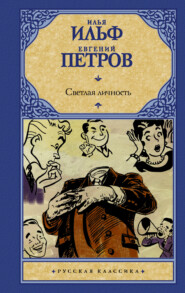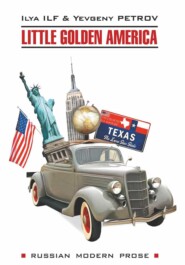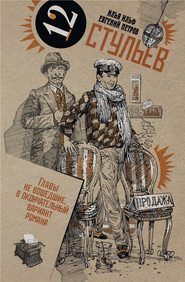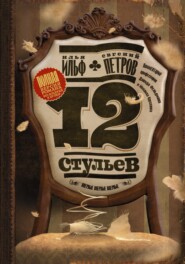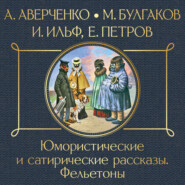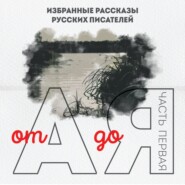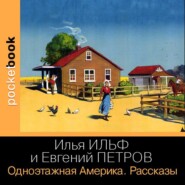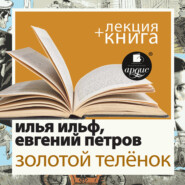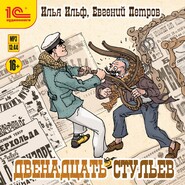По всем вопросам обращайтесь на: info@litportal.ru
(©) 2003-2025.
✖
The Twelve Chairs / Двенадцать стульев. Книга для чтения на английском языке
Автор
Жанр
Год написания книги
1928
Теги
Настройки чтения
Размер шрифта
Высота строк
Поля
Bezenchuk put his finger to his lips to show that he understood perfectly, turned round and, managing to balance his cap on his head although he was staggering, went off. It was only then that Ippolit Matveyevich noticed that he was blind drunk.
Ippolit Matveyevich felt singularly upset. He tried to picture himself coming home to an empty, dirty house. He was afraid his mother-in-law's death would deprive him of all those little luxuries and set ways he had acquired with such effort since the revolutiona revolution which had stripped him of much greater luxuries and a grander way of life. «Should I marry?» he wondered. «But who? The militia chief's niece or Barbara Stepanova, Prusis's sister? Or maybe I should hire a housekeeper. But what's the use? She would only drag me around the law courts. And it would cost me something, too!»
The future suddenly looked black for Ippolit Matveyevich. Full of indignation and disgust at everything around him, he went back into the house. Claudia Ivanovna was no longer delirious. Lying high on her pillows, she looked at Ippolit Matveyevich, in full command of her faculties, and even sternly, he thought.
«Ippolit Matveyevich», she whispered clearly. «Sit close to me. I want to tell you something».
Ippolit Matveyevich sat down in annoyance, peering into his mother-in-law's thin, bewhiskered face. He made an attempt to smile and say something encouraging, but the smile was hideous and no words of encouragement came to him. An awkward wheezing noise was all he could produce.
«Ippolit», repeated his mother-in-law, «do you remember our drawing-room suite?»
«Which one?» asked Ippolit Matveyevich with that kind of polite attention that is only accorded to the very sick.
«The one … upholstered in English chintz».
«You mean the suite in my house?»
«Yes, in Stargorod».
«Yes, I remember it very well … a sofa, a dozen chairs and a round table with six legs. It was splendid furniture. Made by Hambs…. But why does it come to mind?»
Claudia Ivanovna, however, was unable to answer. Her face had slowly begun to turn the colour of copper sulphate. For some reason Ippolit Matveyevich also caught his breath. He clearly remembered the drawing-room in his house and its symmetrically arranged walnut furniture with curved legs, the polished parquet floor, the old brown grand piano, and the oval black-framed daguerreotypes of high-ranking relatives on the walls.
Claudia Ivanovna then said in a wooden, apathetic voice:
«I sewed my jewels into the seat of a chair».
Ippolit Matveyevich looked sideways at the old woman.
«What jewels?» he asked mechanically, then, suddenly realizing what she had said, added quickly:
«Weren't they taken when the house was searched?»
«I hid the jewels in a chair», repeated the old woman stubbornly.
Ippolit Matveyevich jumped up and, taking a close look at Claudia Ivanovna's stony face lit by the paraffin lamp, saw she was not raving.
«Your jewels!» he cried, startled at the loudness of his own voice. «In a chair? Who induced you to do that? Why didn't you give them to me?»
«Why should I have given them to you when you squandered away my daughter's estate?» said the old woman quietly and viciously. Ippolit Matveyevich sat down and immediately stood up again.
His heart was noisily sending the blood coursing around his body. He began to hear a ringing in his ears.
«But you took them out again, didn't you? They're here, aren't they?»
The old woman shook her head.
«I didn't have time. You remember how quickly and unexpectedly we had to flee. They were left in the chair… the one between the terracotta lamp and the fireplace».
«But that was madness! You're just like your daughter», shouted Ippolit Matveyevich loudly.
And no longer concerned for the fact that he was at the bedside of a dying woman, he pushed back his chair with a crash and began prancing about the room.
«I suppose you realize what may have happened to the chairs? Or do you think they're still there in the drawing-room in my house, quietly waiting for you to come and get your jewellery?» The old woman did not answer.
The registry clerk's wrath was so great that the pince-nez fell of his nose and landed on the floor with a tinkle, the gold nosepiece glittering as it passed his knees.
«What? Seventy thousand roubles' worth of jewellery hidden in a chair! Heaven knows who may sit on that chair!»
At this point Claudia Ivanovna gave a sob and leaned forward with her whole body towards the edge of the bed. Her hand described a semi-circle and reached out to grasp Ippolit Matveyevich, but then fell back on to the violet down quilt. Squeaking with fright, Ippolit Matveyevich ran to fetch his neighbour. «I think she's dying», he cried.
The agronomist crossed herself in a businesslike way and, without hiding her curiosity, hurried into Ippolit Matveyevich's house, accompanied by her bearded husband, also an agronomist. In distraction Vorobyaninov wandered into the municipal park.
While the two agronomists and their servants tidied up the deceased woman's room, Ippolit Matveyevich roamed around the park, bumping into benches and mistaking for bushes the young couples numb with early spring love.
The strangest things were going on in Ippolit Matveyevich's head. He could hear the sound of gypsy choirs and orchestras composed of big-breasted women playing the tango over and over again; he imagined the Moscow winter and a long-bodied black trotter that snorted contemptuously at the passers-by. He imagined many different things: a pair of deliriously expensive orange-coloured panties, slavish devotion, and a possible trip to Cannes. Ippolit Matveyevich began walking more slowly and suddenly stumbled over the form of Bezenchuk the undertaker. The latter was asleep, lying in the middle of the path in his fur coat. The jolt woke him up. He sneezed and stood up briskly.
«Now don't you worry, Mr Vorobyaninov», he said heatedly, continuing the conversation started a while before. «There's lots of work goes into a coffin».
«Claudia Ivanovna's dead», his client informed him.
«Well, God rest her soul», said Bezenchuk. «So the old lady's passed away. Old ladies pass away … or they depart this life. It depends who she is. Yours, for instance, was small and plump, so she passed away. But if it's one who's a bit bigger and thinner, then they say she has departed this life…».
«What do you mean ‘they say'? Who says?»
«We say. The undertakers. Now you, for instance. You're distinguished-lookin' and tall, though a bit on the thin side. If you should die, God forbid, they'll say you popped off. But a tradesman, who belonged to the former merchants' guild, would breathe his last. And if it's someone of lower status, say a caretaker, or a peasant, we say he has croaked or gone west. But when the high-ups die, say a railway conductor or someone in administration, they say he has kicked the bucket. They say: „You know our boss has kicked the bucket, don't you?“»
Shocked by this curious classification of human mortality, Ippolit Matveyevich asked:
«And what will the undertakers say about you when you die?»
«I'm small fry. They'll say, ‘Bezenchuk's gone', and nothin' more».
And then he added grimly:
«It's not possible for me to pop off or kick the bucket; I'm too small. But what about the coffin, Mr Vorobyaninov? Do you really want one without tassels and brocade?»
But Ippolit Matveyevich, once more immersed in dazzling dreams, walked on without answering. Bezenchuk followed him, working something out on his fingers and muttering to himself, as he always did.
The moon had long since vanished and there was a wintry cold. Fragile, wafer-like ice covered the puddles. The companions came out on Comrade Gubernsky Street, where the wind was tussling with the hanging shop-signs. A fire-engine drawn by skinny horses emerged from the direction of Staropan Square with a noise like the lowering of a blind.
Swinging their canvas legs from the platform, the firemen wagged their helmeted heads and sang in intentionally tuneless voices:
«Glory to our fire chief,
Glory to dear Comrade Pumpoff!»
«They've been havin' a good time at Nicky's wedding», remarked Bezenchuk nonchalantly. «He's the fire chief's son». And he scratched himself under his coat. «So you really want it without tassels and brocade?»
By that moment Ippolit Matveyevich had finally made up his mind. «I'll go and find them», he decided, «and then we'll see». And in his jewel-encrusted visions even his deceased mother-in-law seemed nicer than she had actually been. He turned to Bezenchuk and said:
Ippolit Matveyevich felt singularly upset. He tried to picture himself coming home to an empty, dirty house. He was afraid his mother-in-law's death would deprive him of all those little luxuries and set ways he had acquired with such effort since the revolutiona revolution which had stripped him of much greater luxuries and a grander way of life. «Should I marry?» he wondered. «But who? The militia chief's niece or Barbara Stepanova, Prusis's sister? Or maybe I should hire a housekeeper. But what's the use? She would only drag me around the law courts. And it would cost me something, too!»
The future suddenly looked black for Ippolit Matveyevich. Full of indignation and disgust at everything around him, he went back into the house. Claudia Ivanovna was no longer delirious. Lying high on her pillows, she looked at Ippolit Matveyevich, in full command of her faculties, and even sternly, he thought.
«Ippolit Matveyevich», she whispered clearly. «Sit close to me. I want to tell you something».
Ippolit Matveyevich sat down in annoyance, peering into his mother-in-law's thin, bewhiskered face. He made an attempt to smile and say something encouraging, but the smile was hideous and no words of encouragement came to him. An awkward wheezing noise was all he could produce.
«Ippolit», repeated his mother-in-law, «do you remember our drawing-room suite?»
«Which one?» asked Ippolit Matveyevich with that kind of polite attention that is only accorded to the very sick.
«The one … upholstered in English chintz».
«You mean the suite in my house?»
«Yes, in Stargorod».
«Yes, I remember it very well … a sofa, a dozen chairs and a round table with six legs. It was splendid furniture. Made by Hambs…. But why does it come to mind?»
Claudia Ivanovna, however, was unable to answer. Her face had slowly begun to turn the colour of copper sulphate. For some reason Ippolit Matveyevich also caught his breath. He clearly remembered the drawing-room in his house and its symmetrically arranged walnut furniture with curved legs, the polished parquet floor, the old brown grand piano, and the oval black-framed daguerreotypes of high-ranking relatives on the walls.
Claudia Ivanovna then said in a wooden, apathetic voice:
«I sewed my jewels into the seat of a chair».
Ippolit Matveyevich looked sideways at the old woman.
«What jewels?» he asked mechanically, then, suddenly realizing what she had said, added quickly:
«Weren't they taken when the house was searched?»
«I hid the jewels in a chair», repeated the old woman stubbornly.
Ippolit Matveyevich jumped up and, taking a close look at Claudia Ivanovna's stony face lit by the paraffin lamp, saw she was not raving.
«Your jewels!» he cried, startled at the loudness of his own voice. «In a chair? Who induced you to do that? Why didn't you give them to me?»
«Why should I have given them to you when you squandered away my daughter's estate?» said the old woman quietly and viciously. Ippolit Matveyevich sat down and immediately stood up again.
His heart was noisily sending the blood coursing around his body. He began to hear a ringing in his ears.
«But you took them out again, didn't you? They're here, aren't they?»
The old woman shook her head.
«I didn't have time. You remember how quickly and unexpectedly we had to flee. They were left in the chair… the one between the terracotta lamp and the fireplace».
«But that was madness! You're just like your daughter», shouted Ippolit Matveyevich loudly.
And no longer concerned for the fact that he was at the bedside of a dying woman, he pushed back his chair with a crash and began prancing about the room.
«I suppose you realize what may have happened to the chairs? Or do you think they're still there in the drawing-room in my house, quietly waiting for you to come and get your jewellery?» The old woman did not answer.
The registry clerk's wrath was so great that the pince-nez fell of his nose and landed on the floor with a tinkle, the gold nosepiece glittering as it passed his knees.
«What? Seventy thousand roubles' worth of jewellery hidden in a chair! Heaven knows who may sit on that chair!»
At this point Claudia Ivanovna gave a sob and leaned forward with her whole body towards the edge of the bed. Her hand described a semi-circle and reached out to grasp Ippolit Matveyevich, but then fell back on to the violet down quilt. Squeaking with fright, Ippolit Matveyevich ran to fetch his neighbour. «I think she's dying», he cried.
The agronomist crossed herself in a businesslike way and, without hiding her curiosity, hurried into Ippolit Matveyevich's house, accompanied by her bearded husband, also an agronomist. In distraction Vorobyaninov wandered into the municipal park.
While the two agronomists and their servants tidied up the deceased woman's room, Ippolit Matveyevich roamed around the park, bumping into benches and mistaking for bushes the young couples numb with early spring love.
The strangest things were going on in Ippolit Matveyevich's head. He could hear the sound of gypsy choirs and orchestras composed of big-breasted women playing the tango over and over again; he imagined the Moscow winter and a long-bodied black trotter that snorted contemptuously at the passers-by. He imagined many different things: a pair of deliriously expensive orange-coloured panties, slavish devotion, and a possible trip to Cannes. Ippolit Matveyevich began walking more slowly and suddenly stumbled over the form of Bezenchuk the undertaker. The latter was asleep, lying in the middle of the path in his fur coat. The jolt woke him up. He sneezed and stood up briskly.
«Now don't you worry, Mr Vorobyaninov», he said heatedly, continuing the conversation started a while before. «There's lots of work goes into a coffin».
«Claudia Ivanovna's dead», his client informed him.
«Well, God rest her soul», said Bezenchuk. «So the old lady's passed away. Old ladies pass away … or they depart this life. It depends who she is. Yours, for instance, was small and plump, so she passed away. But if it's one who's a bit bigger and thinner, then they say she has departed this life…».
«What do you mean ‘they say'? Who says?»
«We say. The undertakers. Now you, for instance. You're distinguished-lookin' and tall, though a bit on the thin side. If you should die, God forbid, they'll say you popped off. But a tradesman, who belonged to the former merchants' guild, would breathe his last. And if it's someone of lower status, say a caretaker, or a peasant, we say he has croaked or gone west. But when the high-ups die, say a railway conductor or someone in administration, they say he has kicked the bucket. They say: „You know our boss has kicked the bucket, don't you?“»
Shocked by this curious classification of human mortality, Ippolit Matveyevich asked:
«And what will the undertakers say about you when you die?»
«I'm small fry. They'll say, ‘Bezenchuk's gone', and nothin' more».
And then he added grimly:
«It's not possible for me to pop off or kick the bucket; I'm too small. But what about the coffin, Mr Vorobyaninov? Do you really want one without tassels and brocade?»
But Ippolit Matveyevich, once more immersed in dazzling dreams, walked on without answering. Bezenchuk followed him, working something out on his fingers and muttering to himself, as he always did.
The moon had long since vanished and there was a wintry cold. Fragile, wafer-like ice covered the puddles. The companions came out on Comrade Gubernsky Street, where the wind was tussling with the hanging shop-signs. A fire-engine drawn by skinny horses emerged from the direction of Staropan Square with a noise like the lowering of a blind.
Swinging their canvas legs from the platform, the firemen wagged their helmeted heads and sang in intentionally tuneless voices:
«Glory to our fire chief,
Glory to dear Comrade Pumpoff!»
«They've been havin' a good time at Nicky's wedding», remarked Bezenchuk nonchalantly. «He's the fire chief's son». And he scratched himself under his coat. «So you really want it without tassels and brocade?»
By that moment Ippolit Matveyevich had finally made up his mind. «I'll go and find them», he decided, «and then we'll see». And in his jewel-encrusted visions even his deceased mother-in-law seemed nicer than she had actually been. He turned to Bezenchuk and said:






